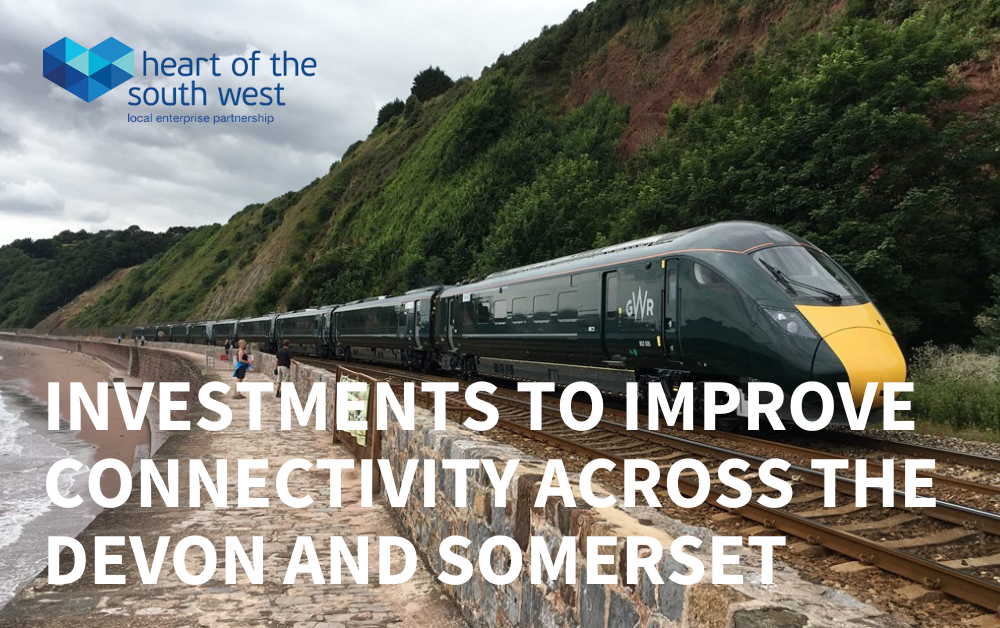The Heart of the South West LEP is calling on Government to confirm its promises and deliver vital funding for transport and digital projects, to improve the region’s strategic connectivity and boost growth.
The South West is England’s most rural region, often falling behind other areas when it comes to being digital and physically connected. Delivering people and businesses with improved connectivity is fundamental to supporting business growth, collaboration, inclusivity and innovation, and is a key enabler for economic growth.
Karl Tucker, Chair of the Heart of the South West LEP, said: “Improving connectivity is vital to increasing productivity and ensuring inclusive economic growth. People and businesses across our peninsula have often struggled to access major roads, high-speed railways, and cutting-edge broadband, holding back our region’s growth and Levelling Up plans. It is therefore vital that Government commit to getting our most hard-to-reach areas connected, improving capacity on our major travel routes and boosting our economic growth.”
This year, the Government is consulting on the third Roads Investment Strategy (RIS3) to set out an investment programme for funding from 2025. The LEP is calling on Government to ensure funding is committed to improving road networks in the South West, including the A303 Stonehenge, A358 Taunton to Southfields, and the A303 South Petherton to Southfields. These upgrades will improve safety, create new jobs, investment and housing, and improve connectivity into and throughout the South West.
Government support for the region’s railway network is also being sought. The South West has led the country’s recovery of rail patronage following the pandemic, with passenger numbers increasing up to 120% of pre-Covid levels. The region has seen Government investment with the Dartmoor Line to Okehampton, the country’s first Restoring Your Railways project to be opened. Devon County Council and Torbay Council have also received funding for new stations at Marsh Barton and Edginswell, and both the Mid Cornwall Metro (Newquay to Falmouth) and the West Devon Hub (Okehampton Parkway) have been awarded Levelling Up funding.
The LEP is supporting local authorities and Great Western Railway in seeking further support to meet the growing demand, including delivering the Restoring Your Railway bids for new stations at Cullompton and Wellington, and the re-opening of the railway line to Tavistock. It will be vital for the region that investment in local rail services continues to support economic development, and improved education and training opportunities.
David Whiteway, Regional Growth Manager (West) at Great Western Railway, said: “We have seen remarkable growth in rail travel from the new service to Okehampton, well above predicted levels. The strong existing partnerships between the rail industry, local and national Government, and business in the South West have shown that we can deliver improvements, and that rail is a key driver for both rural and urban economic development. We very much support the Heart of South West LEP’s ambition for continued growth, and will continue to offer our expertise and advice to help to develop and maintain services.”
Improving digital connectivity is also vital to the South West’s growth. The LEP is helping to fund Connecting Devon & Somerset (CDS) in rolling out superfast broadband to hard-to-reach and underserved rural areas in Devon and Somerset. The programme will connect over 40,000 homes and businesses in the Heart of the South West with next generation broadband by the end of 2024.
The LEP are also supporting the rollout of Government’s ambitions to build a gigabit-capable network across the UK, with newly connected premises in the region able to support gigabit speeds of up to 1,000Mbps.
Councillor Rufus Gilbert, CDS Board Member and Devon County Council Cabinet Member for Economic Recovery and Skills, said: “Our current rollout, involving a number of commercial build partners, is ensuring our local businesses and residents across the CDS region benefit from a gigabit capable full fibre network. We understand how important it is that very hard-to-reach rural areas in our counties receive access to the same digital connectivity as urban areas and are not left behind. We will continue to work towards that aim.”


